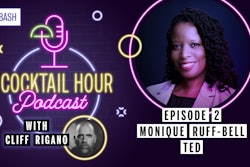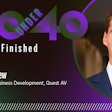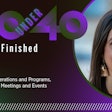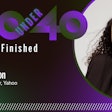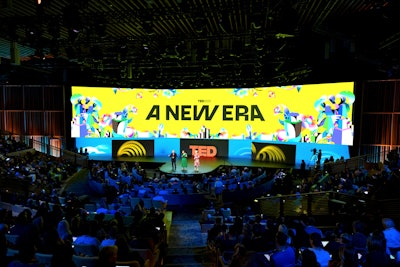
When Time magazine appointed its first chief events officer in late 2023, it sparked countless conversations about the growing power of events as a crucial part of a company's year-round business and marketing strategy.
That point has been reinforced with another C-suite promotion this week: TED—the nonprofit organization known for its short "talks" from influential speakers in the education, business, science, tech, and creativity fields—has promoted Monique Ruff-Bell to the newly created role of chief program and strategy officer.
"There's a growing recognition of events strategists as true business leaders, strategists, and revenue drivers," says Ruff-Bell, who joined TED in 2022 as head of events. "This shift in perception and the increased representation in the C-suite is not only motivating but also inspiring to our industry. This milestone is not just about my personal achievement, but a testament to the broader acknowledgment of the crucial role events play in shaping overall business strategy."  Photo: Courtesy of Monique Ruff-Bell
Photo: Courtesy of Monique Ruff-Bell
BizBash caught up with Ruff-Bell to discuss her new role, the C-suite's shifting attitudes, how events can fit into a year-round marketing strategy, her all-time favorite TED Talk, and much more.
What types of things will fall under your scope in your new role?
As the chief program and strategy officer, I will continue to report to the CEO and be responsible for the strategic leadership for our events, production, TEDx, and partnership sales teams, as well as oversee key marketing verticals for the org. My overall responsibilities include developing and implementing strategic plans aligned with business objectives that focus on impact, growth, and operational efficiency. This role was developed to play a pivotal part in shaping the organization's growth direction and to ensure strategic alignment with driving mission and business success. I basically get to do what I was doing for events on a larger scale.
Tell us a bit about your career journey. You’ve handled events at a variety of high-level places, including Haymarket Media Group, Money20/20, and now TED for the last couple of years. How have those roles prepared you for this new position?
Running event programs for these organizations was a wonderful training ground for becoming much more of a business strategist. These events contributed significantly to business growth and revenue for these organizations, and I continually advanced my skills in leadership, marketing, sales, organizational effectiveness, and more.
I had to set objectives and the overall strategic vision that aligned to company goals, and improve collaboration, budgeting, risk management, data analysis, and innovation—which are all crucial aspects for a chief program and strategy officer who is responsible for shaping and executing high-level organizational strategies. I absolutely had some bumps and bruises along the journey, but I became a stronger and more resilient leader and I’m proud of what I was able to accomplish at these different organizations.
You’ve mentioned you’re seeing growing recognition of event strategists as true business leaders and revenue drivers. Can you expand on that a bit? How are you seeing attitudes shifting in the C-suite?
With the recent resurgence of events getting back to pre-pandemic levels, it’s clear there is a significant impact on growth and revenue to many organizations' business success. Whether fostering positive sentiment with our IRL or virtual experiences, nurturing customer engagement with our evolved formats, or driving impactful revenue growth, we are now being recognized as the innovators and thought leaders we’ve always been because of our resilience and adaptability in the face of challenges like the global pandemic.
We have played a crucial role in transitioning to hybrid and virtual event models, showcasing our ability to innovate and ensure business continuity, and are being more recognized as significant revenue generators to our organizations. Our roles transcend just event coordination (and have always done so) as many of us manage substantial business lines, contributing significantly to the financial health of our organizations. It's gratifying to witness the C-suite recognizing and valuing the contributions we've made to the overall prosperity of our organizations.
From your point of view, why are events such an important part of a successful year-round marketing and business strategy? What value do they bring?
Events are the heartbeat of a successful year-round marketing and business strategy because they offer a level of engagement that is unrivaled. We get to have this direct and unique opportunity to be seen as a place where innovation happens, business gets done, and relationships are strengthened, or as a platform that contributes to shaping industry conversations and trends.
Events are also powerful lead-generation machines. The value they deliver is not only foundational but transformative, and they can play a pivotal role in the overall success and growth of any organization.
What are some challenges you’re still seeing when it comes to the C-suite? Is there still sometimes pushback about the budget required for events, for example?
Recognition is happening, but, of course, the challenges in gaining C-suite buy-in for events with proper budgets still exist. Effectively communicating the value of events remains a hurdle for many because we are still refining the language and data-driven approaches that resonate with C-level executives. One big challenge is the need for events to be perceived as a 'must have' rather than a 'nice to have.' Of course, events can be a powerful revenue generator—but it's equally vital to emphasize their role in building pipeline, enhancing brand equity, and fostering customer and community loyalty, which plays into overall business goals in any organization.
Showcasing how each event contributes to either brand building, lead generation, customer retention, or market positioning—and making sure you keep track of case studies and success stories highlighting instances where events directly contributed to these areas—is important. When we get to present this narrative supported by data in a clear and compelling way, we can position events as a strategic imperative that needs the proper resourcing. We then start to offer a clearer perspective against the challenges and potential pushback related to the C-suite's understanding of budget resourcing for our events.
It has been and continues to be a journey in bridging the understanding gap on event investment versus cost efficiencies, and how proper investment accelerates successful event performance, which ties into successful business outcomes.
What makes you most hopeful about the future of the event industry?
When you work at TED, optimism becomes part of your DNA. But, of course, there are great trends contributing to my optimism as well. For one, the rise of the event professional into the C-suite is telling me that we are being seen more as the business contributors and strategists we’ve always been.
The continual pent-up demand for in-person experiences and the eagerness to attend live events, conferences, and festivals is wonderful. The combining of in-person and virtual elements has opened up new possibilities for reaching broader audiences, and the continuous advancements in event technology and how it’s creating greater interactivity, networking, and engagement is exciting. Plus, let’s not forget this industry's resilience and adaptability in navigating uncertainties shows our superpowers to our organizations. What’s not to be hopeful about!
What are you most excited about in the new role?
I can’t wait to contribute on a broader scale to this beloved organization with such a well-known mission and global impact. In my new role, I get the opportunity to contribute to the strategic direction, growth, and vision of TED in a more comprehensive way. I go beyond a functional role to a chance to guide the organization's long-term plans and goals, spanning multiple departments and functions. I have always been intentional about my career growth and acquiring skills that make me a stronger leader, and this opportunity offers me that chance and more.
But what truly humbled me and filled my heart with gratitude was the response from colleagues and friends when I announced my new role. The overwhelming sentiment was not a matter of 'if' I would reach this pinnacle, but a matter of 'when.' Their unwavering confidence motivates me further, and I am excited about this new chapter of my career.
I have to ask: Do you have an all-time favorite TED Talk?
I certainly do! Reshma Saujani's 'Teach Girls Bravery, Not Perfection' resonated so strongly with me. It explores the societal expectations placed on girls and women to be perfect and risk-averse. She talks about how we are socialized to be perfect, to avoid taking risks, and to prioritize getting everything right—and in contrast, boys are often encouraged to be brave, take risks, and not be afraid of failure. This conditioning leads to a confidence gap between men and women in the workforce.
As a hiring manager, I have seen this play out time and again, and it’s so frustrating to me. Perfectionism can be paralyzing for many, especially women, which hinders many of us in pursuing goals. It’s imperative for us to leave perfectionism behind in order to cultivate a sense of bravery and resilience, especially in this current world. We need this cultural shift to happen ASAP in order to empower more women and girls to continue to shift into more leaders and innovators of the future.





